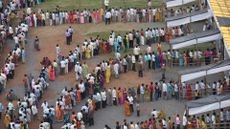Labour-SNP coalition adds up (if you ignore Trident issue)
Projection says this is the only pairing that can win a majority – but Labour won’t budge on Trident

Labour will not support the scrapping of Trident in order to form a coalition with the Scottish Nationalists, should they be the biggest party in a hung parliament on 8 May.
Ed Miliband’s campaign chief Douglas Alexander told Andrew Marr yesterday: “It’s the responsibility of a Labour government to keep this country safe.” As the likely Foreign Secretary if Labour win power, Alexander added: “Our position on Trident is clear and I’m not changing it.”
Alexander did not categorically rule out an election pact of some sort with the SNP. But abandoning the replacement of the nuclear deterrent would not be up for negotiation, he insisted, and nor would Sturgeon’s other demand – that Scotland be given full fiscal autonomy.
Subscribe to The Week
Escape your echo chamber. Get the facts behind the news, plus analysis from multiple perspectives.

Sign up for The Week's Free Newsletters
From our morning news briefing to a weekly Good News Newsletter, get the best of The Week delivered directly to your inbox.
From our morning news briefing to a weekly Good News Newsletter, get the best of The Week delivered directly to your inbox.
Alexander’s tough talk came as Electoral Calculus released a projection that a Labour-SNP pairing is the only combination of parties that would cross the threshold of 326 seats necessary for a Commons majority.
The projection is based on current polling averages which have the Conservatives and Labour neck and neck and the Lib Dems set to retain barely a third of the support they enjoyed in 2010.
According to the projection, Labour would have 297 MPs and the Tories only 265. The Lib Dems would shrink to 17 MPs and the Scottish Nationalists would jump from six to 47. On that basis, the Tories and Lib Dems would be able to muster only 282 MPs – way off the necessary 326. But the Labour-SNP pairing would have 344, enough for a majority.
Before anyone gets too excited – or alarmed – the Electoral Calculus projection was not the only one released this weekend. A second forecast comes from Professor Paul Whiteley at the University of Essex, a former director of the British Election Study – and it suggests a very different outcome.
Whiteley gives Labour a much narrower lead – 291 to the Tories’ 281 – and crucially he believes the Lib Dems will do much better than most observers give them credit for and the Scots Nationalists much worse. He sees Nick Clegg’s party holding on to 48 of their current 57 seats whereas the SNP would struggle to get into double figures.
As a result, under Whiteley’s projection the Lib Dems would have a choice of coalition partners: a pairing with Labour would total 339 MPs - a Commons majority of 14. A Tory-Lib Dem coalition would muster 329 - a majority of just three.
Whiteley admits that the SNP are a “wild card” but he suggests they won’t do as well as recent polls suggest because increasingly Scots see the Westminster election as secondary to the Holyrood poll. He expects turn-out to be lower than in the high-profile Scottish referendum.
His positive forecast for the Lib Dems is based on there being a “stronger incumbent effect for Lib Dem MPs than any other parties, partly due to many of their MPs long holding marginal seats”.
So, who's got it right - Electoral Calculus or Prof Whiteley? We should get an idea in the next couple of days when Lord Ashcroft reveals the long-awaited results of his polling in Scottish seats.
Create an account with the same email registered to your subscription to unlock access.
Sign up for Today's Best Articles in your inbox
A free daily email with the biggest news stories of the day – and the best features from TheWeek.com
-
 Netherlands split on WFH for sex workers
Netherlands split on WFH for sex workersSpeed Read Councils concerned over 'nuisance' of at-home sex work, but others say changes will curb underground sex trade
By Arion McNicoll, The Week UK Published
-
 'He adored Trump, and then rejected him'
'He adored Trump, and then rejected him'Today's Newspapers A roundup of the headlines from the US front pages
By The Week Staff Published
-
 The Thursday Murder Club: who's in the film and what we can expect
The Thursday Murder Club: who's in the film and what we can expectSpeed Read Author Richard Osman reveals starry cast set to play his 'septuagenarian sleuths'
By Adrienne Wyper, The Week UK Published
-
 Peter Murrell: Sturgeon's husband charged over SNP 'embezzlement' claims
Peter Murrell: Sturgeon's husband charged over SNP 'embezzlement' claimsSpeed Read SNP expresses 'shock' as former chief executive rearrested in long-running investigation into claims of mishandled campaign funds
By Arion McNicoll, The Week UK Published
-
 Will Aukus pact survive a second Trump presidency?
Will Aukus pact survive a second Trump presidency?Today's Big Question US, UK and Australia seek to expand 'game-changer' defence partnership ahead of Republican's possible return to White House
By Sorcha Bradley, The Week UK Published
-
 It's the economy, Sunak: has 'Rishession' halted Tory fightback?
It's the economy, Sunak: has 'Rishession' halted Tory fightback?Today's Big Question PM's pledge to deliver economic growth is 'in tatters' as stagnation and falling living standards threaten Tory election wipeout
By Harriet Marsden, The Week UK Published
-
 Why your local council may be going bust
Why your local council may be going bustThe Explainer Across England, local councils are suffering from grave financial problems
By The Week UK Published
-
 Rishi Sunak and the right-wing press: heading for divorce?
Rishi Sunak and the right-wing press: heading for divorce?Talking Point The Telegraph launches 'assault' on PM just as many Tory MPs are contemplating losing their seats
By Keumars Afifi-Sabet, The Week UK Published
-
 How would a second Trump presidency affect Britain?
How would a second Trump presidency affect Britain?Today's Big Question Re-election of Republican frontrunner could threaten UK security, warns former head of secret service
By Harriet Marsden, The Week UK Published
-
 'Rwanda plan is less a deterrent and more a bluff'
'Rwanda plan is less a deterrent and more a bluff'Instant Opinion Opinion, comment and editorials of the day
By The Week UK Published
-
 How the biggest election year in history might play out
How the biggest election year in history might play outThe Explainer Votes in world's biggest democracies, as well as its most 'despotic' and 'stressed' countries, face threats of violence and suppression
By Harriet Marsden, The Week UK Published